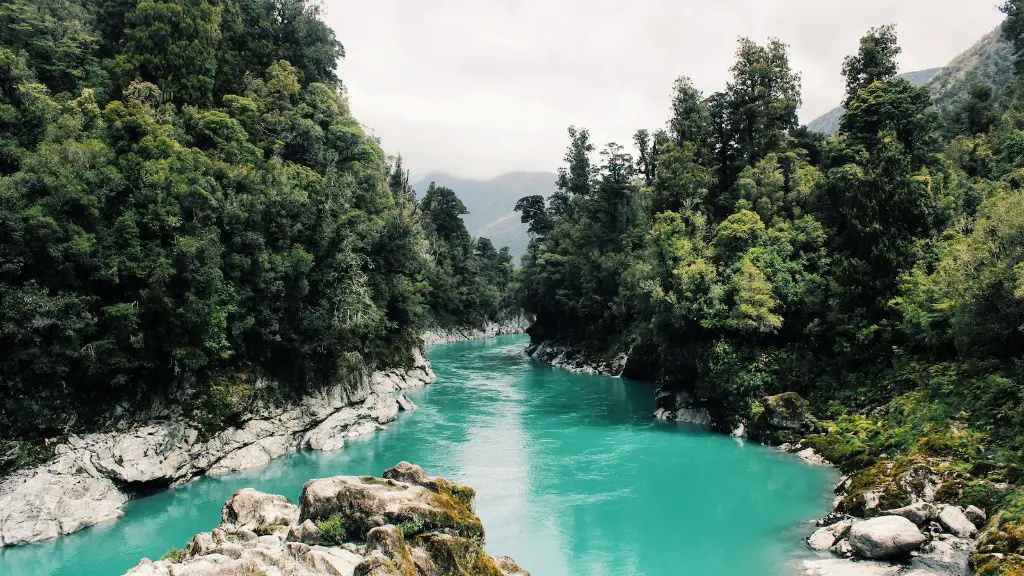One of the most fascinating aspects of Egyptian civilization is the legendary Nile River. For centuries, the Nile was an integral part of Egyptian life, providing the people with food, transportation, communication and sustenance. The river sustained life in ancient times, and its influence is still felt today.
The Nile River originates in Ethiopia in the Great African Lakes and flows northward into the Mediterranean Sea. It is the longest river in the world, stretching for over 4,000 miles. The ancient Egyptians used the river for many different activities and were completely reliant on it for their daily lives.
The Egyptians used the Nile’s waters to irrigate their land, enabling them to grow crops such as wheat, barley, vegetables and fruit. This allowed the population to sustain itself. The river also provided a means of transportation, providing a vital trade route and access to distant cities.
The Egyptians also used the Nile to power machines, build monuments and irrigate their fields. It provided them with the fuel they needed to build the great pyramids, with limestone blocks and wood harvested from the banks of the Nile.
The Nile also provided the ancient Egyptians with fishing and hunting opportunities. Food was scarce in the dry regions, so the river was the primary source of sustenance. Fish and fowl were captured and the animals used for food and clothing.
The Nile’s importance to the ancient Egyptians doesn’t just lie in the physical things it provided. The river played an important role in their culture, mythology and religion. The Egyptians believed that the spirit of the gods resided in the river. They made offerings to the gods in the form of boats, trinkets and food.
The Nile was also seen as a life-giving source of fertility. The annual flooding of the river rejuvenated the crops and provided fish and other animals with a much needed source of food. This made it a symbol of the Egyptians’ power and strength.
The river was so important to the ancient Egyptians that they built places of worship around it. Temples were built to honor the gods and goddesses associated with the river. Statues of gods and goddesses were placed in the river and worshiped by the Egyptians.
Religious Significance of the Nile
Religion and the Nile were intertwined in ancient Egyptian civilization. The river was considered a place of the gods. Its yearly floods were thought to be sent from the gods, renewing the fertility of the soil and bringing life to the land. The gods of the Nile were worshipped by the Egyptians, who believed that their prayers could be answered if their offerings pleased the gods. In addition, the river was seen as a conduit between the human and divine worlds.
The Egyptians believed that the gods resided in the waters of the Nile. Pharaohs were associated with the gods, and thus were considered living gods as well. Ceremonies were performed at various points along the river, to honor and placate the gods. Statues of gods and goddesses were placed in the river, as a sign of respect, and offerings were made to the gods in the form of boats, trinkets and food.
The Nile played an important role in the day-to-day life of the ancient Egyptians. It provided them with food, transportation, and other necessities. It was also seen as a source of life, fertility, and power. The river was deeply intertwined with religion and was considered a bridge to the gods.
Economic Significance of the Nile
The Nile was of immense importance to the ancient Egyptians for economic reasons as well. The river enabled them to instantaneously trade with distant cities and countries. The boats that sailed on the Nile could even journey all the way to Lebanon or the Sudan. This allowed goods to travel farther, enriching the ancient Egyptian economy.
The waters of the Nile also provided fish and other aquatic life that the ancient Egyptians would use for food. The river was a source of irrigation, allowing them to grow important crops such as wheat, barley, vegetables and fruit. These, in turn, would be used to feed the population. The river also enabled mills, which were important for grinding wheat and other grains into flour. This process was essential for baking bread, a staple food of the ancient Egyptians.
The river was also important for communication, as it allowed messages to be quickly relayed from one place to another. Finally, the Nile provided the Egyptians with the raw materials they needed to build the great pyramids, with limestone blocks and wood harvested from the banks of the Nile.
Environmental Impact of the Nile
The Nile has had a tremendous impact on the environment. The annual floods have filled the Nile Valley with nutrients, making it one of the most fertile regions on earth. This has allowed the population to grow and thrive. However, the river is also under threat, as the waters of the Nile have been heavily dammed and the flow has been restricted. This has caused irreparable damage to the surrounding environment.
Moreover, the population of ancient Egypt largely depended on the river, which is why the river’s changing water level remains a major concern. Climate change, overpopulation, and pollution are all contributing to the degradation of the river. If the situation is not addressed, the consequences could be devastating.
Finally, the Nile has come to symbolize the power and resilience of the ancient Egyptian civilization. It is a reminder of how dependent people are on their environment and how much the environment can be changed in the face of human activity.
Political Impact of the Nile
The Nile River has had a profound impact on the political history of the region. For centuries, the river was a source of power and wealth, as access to its waters enabled the rulers to maintain control over the population. In ancient times, the Egyptians would rely on its waters to irrigate their fields, power their machines, and provide them with sustenance. By controlling the river, the Pharaohs were able to maintain a monopoly on food supplies.
In modern times, the importance of the river combines with that of other political issues. With the river serving as a point of contention between various nations in the region, ongoing disputes over its management continue to dominate the political landscape.
In recent years, the re-emergence of military alliances led by the arch rivals Egypt and Ethiopia over the control of the river has increased the political stakes of the region. This struggle is a warning to the world of the chaos that can erupt when control of water resources is at stake.
The Nile River is one of the world’s most important rivers and its importance in the history of the world cannot be understated. The ancient Egyptians used it to irrigate crops, power machines, and sustain their culture. It was a source of sustenance and was deeply intertwined with religion and mythology. It was also a source of economic and political power, and is still a source of contention in the region.





